Lesson 31 don’t fall, Danny 教案
文档属性
| 名称 | Lesson 31 don’t fall, Danny 教案 |

|
|
| 格式 | zip | ||
| 文件大小 | 118.6KB | ||
| 资源类型 | 教案 | ||
| 版本资源 | 冀教版 | ||
| 科目 | 英语 | ||
| 更新时间 | 2017-03-23 08:57:14 | ||
图片预览



文档简介
Lesson
31
don’t
fall,
Danny
教案
1教学目标
1.
Make
the
Ss
can
master
the
new
words
and
phrases.
2.
How
to
talk
about
the
Olympics
and
Records.
3.
Master
the
Grammar:
Comparative
and
Superlative—Adjectives
and
Adverbs.
2学情分析
Step
1.
Analysis
of
the
student.
(学生分析)
Greet
the
students
in
English
and
make
sure
they
can
response
correctly.
Review:
Last
week,
we
learned
about
business,
and
we
knew
how
to
push
a
product,
and
how
to
raise
money,
how
to
make
money
for
the
school
activities.
Then
this
week,
we
will
learn
about
talking
the
Olympics
and
Records.
3重点难点
三、Key
points:(重点)
How
to
talk
about
the
Olympics
and
Records.
四、Difficult
points:(难点)
4教学过程
活动1【导入】Step 2. Lead in.(引入)
Come
to
“Think
About
It!”
What
world
records
do
you
know
of
Do
you
think
you
can
set
a
record
in
your
class
What
is
it
活动2【讲授】Step 3. New lesson.(新课)
No.
1.
Prepare
lessons
before
class.
Teach
the
new
words
and
phrases.
Make
sure
the
Ss
can
read
it
correctly.
No.
2.
Text:
Give
them
some
time
to
read
the
text
themselves.
Then
let
them
act
out
the
dialogue
in
groups.
Correct
their
pronunciation
when
necessary.
Listen
and
write
true
(T)
or
false
(F)
1.
Danny
dreams
about
breaking
the
record
for
standing
on
one
foot.
(
)
2.
The
world
record
for
standing
on
one
foot
is
eight
minutes.
(
)
3.
Jenny
will
have
chicken
for
supper.(
)
4.
Danny
doesn’t
realize
his
dream.(
)
Read
the
lesson
and
answer
the
questions:
1.
How
does
Danny
feel
while
standing
on
one
foot
2
How
long
does
Danny
stand
on
one
foot
Why
does
Danny
give
up
At
last,
the
teacher
explains
the
text
in
Chinese;
make
sure
the
Ss
can
under-stand
the
meaning
of
text.
No.
3.
Important
notes:
1.stand
on
one
foot
单脚站立
He
can
stand
on
one
foot
for
2
hours.
Do
you
know
who
is
the
champion
of
standing
on
one
foot
2.
set
/
keep
/
break
a
world
record
创造/保持/打破一项世界纪录
He
broke
a
record
at
the
sports.
3.
relative
n.亲戚
Many
relatives
came
to
my
home
for
Grandpa’s
80th
birthday
last
Sunday.
I
will
visit
my
friends
and
relatives
on
holidays.
No.4.
The
Grammar:
Comparative
and
Superlative—Adjectives
and
Adverbs.
(1)形容词、副词有三个等级:原级,比较级:比较……,更……一些,最高级:
最……
表示两者间的比较用比较级。
其常见句式有:
1.“A+
be+形容词比较级
+
than+
B”意思为“A比B更……”。
2.“become+
形容词比较级
+
and+
形容词比较级”是“变得越来越……”的意思,and连接同一个形容词的比较级。
3.在含有or的选择疑问句中,如果有两者供选择,前面的形容词要用比较级形式。
(2)形容词、副词的最高级形式主要用来表示三者或三者以上人或事物的比较,表示“最……”的意思。句子中有表示范围的词或短语。如:of
the
three,
in
our
class等等。
如:He
is
the
tallest
in
our
class.他在我们班里是最高的。
(3)形容词和副词的比较级变化规则:
规则变化
①单音节词直接在其后面加-er/-est。tall-taller-tallest;hard-harder-hardest
②以字母e结尾的单音节词在其后面直接加-r/-st。例如:brave-braver-bravest③以一个辅音字母结尾闭音节单音节词,双写这个辅音字母再加-er/-est。
例如:big-bigger-biggest;
hot-hotter-hottest
④以辅音字母+y结尾的双音节词,先把y改为i,再加-er/-est
例如:happy-happier-happiest
⑤其他双音节词和多音节的词,在前面加more和most
例如:interesting-more
interesting-most
interesting
carefully-more
carefully-most
carefully
不规则变化
good/well-better-best;
bad/ill-worse-worst;
many/much-more-most
little-less-least;
far-farther-farthest;
badly-worse-worst
No.
5.
Finish
“Let’s
Do
It!”
Step
4.Listen
to
the
text.
Make
the
Ss
listen
to
the
text,
then
let
them
read
follow
the
material.
活动3【讲授】Step
5.
Summary.(小结)
Sum
up
the
text
what
we
learned,
the
new
words,
phrases,
and
sentences.
Sum
up
the
grammar.
31
don’t
fall,
Danny
教案
1教学目标
1.
Make
the
Ss
can
master
the
new
words
and
phrases.
2.
How
to
talk
about
the
Olympics
and
Records.
3.
Master
the
Grammar:
Comparative
and
Superlative—Adjectives
and
Adverbs.
2学情分析
Step
1.
Analysis
of
the
student.
(学生分析)
Greet
the
students
in
English
and
make
sure
they
can
response
correctly.
Review:
Last
week,
we
learned
about
business,
and
we
knew
how
to
push
a
product,
and
how
to
raise
money,
how
to
make
money
for
the
school
activities.
Then
this
week,
we
will
learn
about
talking
the
Olympics
and
Records.
3重点难点
三、Key
points:(重点)
How
to
talk
about
the
Olympics
and
Records.
四、Difficult
points:(难点)
4教学过程
活动1【导入】Step 2. Lead in.(引入)
Come
to
“Think
About
It!”
What
world
records
do
you
know
of
Do
you
think
you
can
set
a
record
in
your
class
What
is
it
活动2【讲授】Step 3. New lesson.(新课)
No.
1.
Prepare
lessons
before
class.
Teach
the
new
words
and
phrases.
Make
sure
the
Ss
can
read
it
correctly.
No.
2.
Text:
Give
them
some
time
to
read
the
text
themselves.
Then
let
them
act
out
the
dialogue
in
groups.
Correct
their
pronunciation
when
necessary.
Listen
and
write
true
(T)
or
false
(F)
1.
Danny
dreams
about
breaking
the
record
for
standing
on
one
foot.
(
)
2.
The
world
record
for
standing
on
one
foot
is
eight
minutes.
(
)
3.
Jenny
will
have
chicken
for
supper.(
)
4.
Danny
doesn’t
realize
his
dream.(
)
Read
the
lesson
and
answer
the
questions:
1.
How
does
Danny
feel
while
standing
on
one
foot
2
How
long
does
Danny
stand
on
one
foot
Why
does
Danny
give
up
At
last,
the
teacher
explains
the
text
in
Chinese;
make
sure
the
Ss
can
under-stand
the
meaning
of
text.
No.
3.
Important
notes:
1.stand
on
one
foot
单脚站立
He
can
stand
on
one
foot
for
2
hours.
Do
you
know
who
is
the
champion
of
standing
on
one
foot
2.
set
/
keep
/
break
a
world
record
创造/保持/打破一项世界纪录
He
broke
a
record
at
the
sports.
3.
relative
n.亲戚
Many
relatives
came
to
my
home
for
Grandpa’s
80th
birthday
last
Sunday.
I
will
visit
my
friends
and
relatives
on
holidays.
No.4.
The
Grammar:
Comparative
and
Superlative—Adjectives
and
Adverbs.
(1)形容词、副词有三个等级:原级,比较级:比较……,更……一些,最高级:
最……
表示两者间的比较用比较级。
其常见句式有:
1.“A+
be+形容词比较级
+
than+
B”意思为“A比B更……”。
2.“become+
形容词比较级
+
and+
形容词比较级”是“变得越来越……”的意思,and连接同一个形容词的比较级。
3.在含有or的选择疑问句中,如果有两者供选择,前面的形容词要用比较级形式。
(2)形容词、副词的最高级形式主要用来表示三者或三者以上人或事物的比较,表示“最……”的意思。句子中有表示范围的词或短语。如:of
the
three,
in
our
class等等。
如:He
is
the
tallest
in
our
class.他在我们班里是最高的。
(3)形容词和副词的比较级变化规则:
规则变化
①单音节词直接在其后面加-er/-est。tall-taller-tallest;hard-harder-hardest
②以字母e结尾的单音节词在其后面直接加-r/-st。例如:brave-braver-bravest③以一个辅音字母结尾闭音节单音节词,双写这个辅音字母再加-er/-est。
例如:big-bigger-biggest;
hot-hotter-hottest
④以辅音字母+y结尾的双音节词,先把y改为i,再加-er/-est
例如:happy-happier-happiest
⑤其他双音节词和多音节的词,在前面加more和most
例如:interesting-more
interesting-most
interesting
carefully-more
carefully-most
carefully
不规则变化
good/well-better-best;
bad/ill-worse-worst;
many/much-more-most
little-less-least;
far-farther-farthest;
badly-worse-worst
No.
5.
Finish
“Let’s
Do
It!”
Step
4.Listen
to
the
text.
Make
the
Ss
listen
to
the
text,
then
let
them
read
follow
the
material.
活动3【讲授】Step
5.
Summary.(小结)
Sum
up
the
text
what
we
learned,
the
new
words,
phrases,
and
sentences.
Sum
up
the
grammar.
同课章节目录
- Unit 1 Spring Is Coming
- Lesson 1 How's the weather?
- Lesson 2 It's Getting Warmer!
- Lesson 3 Sun Is Rising
- Lesson 4 The Spring City
- Lesson 5 Babysitting on a Spring Day
- Lesson 6 Stories about Spring
- Unit 2 Plant a Plant
- Lesson 7 Planting Trees
- Lesson 8 Why Are Plants Important?
- Lesson 9 Gardening with Mary
- Lesson 10 Make Your Garden Grow!
- Lesson 11 Amazing Plants
- Lesson 12 Danny's Plant
- Unit 3 Animals Are Our Friends
- Lesson 13 Danny's Big Scare
- Lesson 14 Amazing Animals
- Lesson 15 The Zoo Is Open
- Lesson 16 The Pear Escaped
- Lesson 17 Save the Tigers
- Lesson 18 Friendship Between Animals
- Unit 4 The Internet Connects Us
- Lesson 19 How Do You Use the Internet?
- Lesson 20 A Computer Helps!
- Lesson 21 Books or Computers?
- Lesson 22 Travel on the Internet
- Lesson 23 The Internet--Good or Bad?
- Lesson 24 An E-mail to Grandpa
- Unit 5 Buying and Selling
- Lesson 25 Raising Money
- Lesson 26 Cookies, Please!
- Lesson 27 Business English
- Lesson 28 Ms. Liu's Great Idea
- Lesson 29 How to Push a Product
- Lesson 30 A Cookie Sale
- Unit 6 Be a Champion!
- Lesson 31 Don't Fall, Danny
- Lesson 32 My Favourite Record
- Lesson 33 2800 Years of Sports
- Lesson 34 Modern Olympics
- Lesson 35 The Dream Team
- Lesson 36 Classroom Olympics
- Unit 7 Know Our World
- Lesson 37 Let's Learn Geography!
- Lesson 38 The World Is a Big Place
- Lesson 39 Ring Up or Call?
- Lesson 40 Body Language
- Lesson 41 A Class of the World
- Lesson 42 North America
- Unit 8 Save Our World
- Lesson 43 Let's Clean Up!
- Lesson 44 Environment Clubs
- Lesson 45 Let's Sort Garbage!
- Lesson 46 Protect Our Environment
- Lesson 47 Connected to Nature
- Lesson 48 Garbage Is Interesting!
